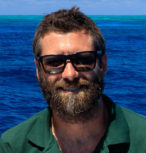DNA reveals the past and future of coral reefs
New DNA techniques are being used to understand how coral reacted to the end of the last ice age in order to better predict how they will cope with current changes to the climate. James Cook Univer

From 2005 to 2022, the main node of the ARC Centre of Excellence for Coral Reef Studies was headquartered at James Cook University in Townsville, Queensland (Australia)








Abstract:
Market-based instruments, such as ecolabelling, can incentivise sustainable fisheries management through improved market access and price premiums. However, such instruments are rarely used in small-scale fisheries in developing nations, where they are arguably needed the most. I this talk I will discuss how market-based instruments (ecolabeling and supply chain simplification) in conjunction with conventional management measures (e.g. size limits and Marine Protected Areas [MPAs]) were applied to a small-scale sea cucumber fishery in southern Manus, Papua New Guinea. Tribal fishery management occurred through a customary rights-based framework. In 2017 fishers who sold through their tribal cooperative had economic returns that were 240% greater than business-as-usual. Community-based management delivered mixed results – sea cucumber densities declined in two out of three monitored MPAs, but remained significantly higher than adjacent open areas. These results demonstrate that market-based instruments can be applied to small-scale sea cucumber fisheries for simultaneous economic and ecological gains.
Biography:
Peter (Pete) Waldie completed his PhD at the ARC Centre of Excellence for Coral Reef Studies at James Cook University, where he investigated the suitability of community-based management in conserving large, threatened, fishery-targeted coral reef fishes. Pete’s PhD research was conducted in New Ireland Province in Papua New Guinea, where he spent many months living in remote communities to gain a rich understanding of the benefits and pitfalls of customary, community-based governance. Since completing his PhD, Pete has worked as a Fisheries Scientist for The Nature Conservancy, supporting community partners in Melanesia and Micronesia to effectively manage their fisheries. One such partnership in Papua New Guinea has culminated in the creation of a marine protected area network across a 2.4-million-hectare seascape and provided local resource owners with access to premium sustainable seafood markets in Hong Kong, directly incentivising sustainable resource management.
New DNA techniques are being used to understand how coral reacted to the end of the last ice age in order to better predict how they will cope with current changes to the climate. James Cook Univer
A new study on the effects of climate change in five tropical countries has found fisheries are in more trouble than agriculture, and poor people are in the most danger. Distinguished Profess
James Cook University researchers have found brightly coloured fish are becoming increasingly rare as coral declines, with the phenomenon likely to get worse in the future. Christopher Hemingson, a
Researchers working with stakeholders in the Great Barrier Reef region have come up with ideas on how groups responsible for looking after the reef can operate more effectively when the next bleaching
Abstract: As marine species adapt to climate change, their heat tolerance will likely be under strong selection. Individual variation in heat tolerance and its heritability underpin the potential fo
Abstract: The Reef Ecology Lab in KAUST’s Red Sea Research Center explores many aspects of movement ecology of marine organisms, ranging from adult migrations to intergenerational larval dispersal
Abstract: Macroalgal meadows are a prominent, yet often maligned component of the tropical seascape. Our work at Ningaloo reef in WA demonstrate that canopy forming macroalgae provide habitat for ad
Abstract: Sharks are generally perceived as strong and fearsome animals. With fossils dating back at least 420 million years, sharks are not only majestic top predators but they also outlived dinosa
Abstract: Connectivity plays a vital role in many ecosystems through its effects on fundamental ecological and evolutionary processes. Its consequences for populations and metapopulations have been
Abstract: Evolution of many eukaryotic organisms is affected by interactions with microbes. Microbial symbioses can ultimately reflect host’s diet, habitat range, and even body shape. However, how
Abstract: The past few years have seen unprecedented coral bleaching and mortality on the Great Barrier Reef (GBR) but the consequences of this on biodiversity are not yet known. This talk will expl